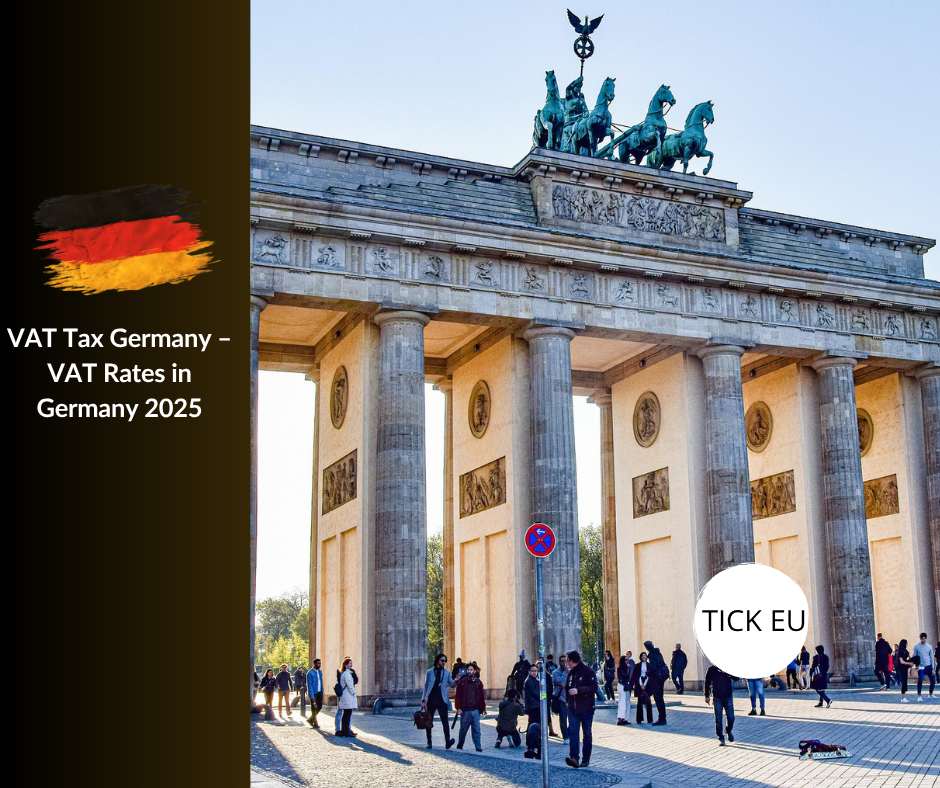German VAT – What You Need to Know About VAT Rates in Germany in 2025
VAT is a topic that may seem complex at first, but understanding it is essential if you run a business in Europe—especially in an economic powerhouse like Germany. In this article, we’ll break down the German VAT system step by step: what the current VAT rates are in Germany in 2025, how they differ, who needs to register, when to file, and how the entire process works in practice.
All of this explained in clear, straightforward language—so that anyone, even without tax expertise, can understand how German VAT works, how to prepare for it, and what to watch out for.
What Is German VAT and Why Does It Matter?
German VAT—known as Mehrwertsteuer or Umsatzsteuer—is the country’s main consumption tax, applied to most goods and services sold within Germany. While the term “VAT” may sound familiar to businesses operating in other EU countries, the specific rules in Germany can differ. Understanding those differences is crucial if you trade with German clients, sell into the German market, or plan to set up operations there.
VAT is also a major source of government revenue—and it’s taken seriously. German tax authorities are known for being thorough and strict. But don’t worry: understanding the rules is already half the battle.
How Much Is VAT in Germany? – 2025 VAT Rates
As of 2025, Germany continues to apply three main VAT rates:
Standard VAT Rate: 19%
This applies to the majority of goods and services, such as electronics, clothing, consulting services, and more.Reduced VAT Rate: 7%
This covers essential items such as food, books, newspapers, local transport, and certain cultural services.Zero VAT Rate: 0%
Applied in specific cases, like exports outside the EU and certain international transactions.
So, if you’re wondering “how much is VAT in Germany?”, the answer depends on what you’re selling or buying—but in most cases, it’s 19%.
How Does VAT Work in Practice?
Although the VAT rates may seem simple, their application can be nuanced. For example, printed books are taxed at 7%, but e-books used to be taxed at 19%—now they also fall under 7%. Restaurant services? It depends on whether it’s dine-in or catering—each can have a different rate.
That’s why asking “what VAT applies in Germany?” is essential for each product or service. When in doubt, consult a tax advisor or check official guidelines from the Finanzamt (German tax office).
When Do You Need to Register for VAT in Germany?
You might need to register for VAT in Germany if:
You sell goods to private customers in Germany and exceed the EU-wide distance selling threshold of €10,000 per year.
You store inventory in Germany, even if your company is based elsewhere.
You import goods from outside the EU into Germany.
You provide certain services (e.g., events, property-related activities) directly in Germany.
If any of these apply, you must register for German VAT—preferably before reaching the threshold to avoid penalties.
How to Register for VAT in Germany
Registering for VAT in Germany may seem complicated—especially if you’re unfamiliar with the language or the system—but it’s manageable. You can do it yourself or appoint a local representative. The process involves:
Submitting an application to the local Finanzamt.
Providing documents such as your business registration, tax ID, articles of incorporation, and identification.
Receiving a German VAT number (USt-IdNr.).
Once registered, you’re required to file periodic VAT returns—monthly, quarterly, or annually—depending on your turnover. An annual VAT summary report is also due by July 31 of the following year.
VAT and Different Sectors in Germany
Not all sectors follow the same VAT rules. In Germany, industries such as hospitality, transportation, and culture may have special VAT treatments. For example, in 2025, the 7% VAT rate still applies to many cultural services to promote accessibility.
E-commerce businesses must follow the EU VAT e-commerce package introduced in 2021. This means that online retailers selling into Germany need to track thresholds and understand when to register.
German VAT for Polish (or Other EU) Businesses
For Polish companies (and other EU-based businesses), two scenarios are most common:
Exporting goods to Germany – usually taxed at 0%, provided you meet the EU export requirements and retain proper documentation.
Selling to German consumers (B2C) – usually requires applying German VAT rates and registering locally.
In both cases, knowing how VAT in Germany works is essential. Failure to register or apply the correct rate can result in fines and audits.
Audits, Refunds, and Obligations
German tax authorities are rigorous, and foreign companies are often subject to inspections. Invoices must meet German requirements—correct VAT number, service descriptions, issue dates, and recipient details.
However, if your German VAT is handled correctly, VAT refunds may be possible. For instance, if you purchase goods in Germany for business use but don’t sell anything locally, you might be eligible for a refund—usually by September 30 of the following year.
What’s Next for German VAT?
As of 2025, there are no announced changes to Germany’s standard 19% VAT rate. Germany tends to maintain tax stability, and any changes are usually well-communicated in advance. Still, if you work in transport, digital services, or e-commerce, it’s wise to keep an eye on updates.
Final Thoughts – Mastering VAT in Germany
German VAT may seem intimidating at first—but once you understand the basics (rates, registration, filing obligations), the rest is about consistent compliance and good bookkeeping.
Remember: VAT in Germany isn’t just a legal obligation—it’s a gateway to one of Europe’s biggest and most lucrative markets. Use it to your advantage, and expand your business with confidence.


